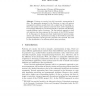Free Online Productivity Tools
i2Speak
i2Symbol
i2OCR
iTex2Img
iWeb2Print
iWeb2Shot
i2Type
iPdf2Split
iPdf2Merge
i2Bopomofo
i2Arabic
i2Style
i2Image
i2PDF
iLatex2Rtf
Sci2ools
PARMA
2004
2004
Towards a Language for Pattern Manipulation and Querying
Patterns are concise, but rich in semantic, representation of data. The approaches proposed in the literature to cope with pattern management problems usually deal with a single type of knowledge artifact and mainly concern pattern extraction issues. Little emphasis has been posed in defining an overall environment to represent and efficiently manage different types of patterns. The first general approach to deal with patterns has been proposed in the context of the PANDA project [1]. In this paper, we discuss some basic requirements for pattern manipulation and retrieval, represented according to the PANDA model. The proposed languages extend previous proposals and represent the basis for the development of an efficient pattern query processor.
Concern Pattern Extraction | Database | Efficient Pattern Query | PARMA 2004 | Pattern Management Problems |
Related Content
| Added | 31 Oct 2010 |
| Updated | 31 Oct 2010 |
| Type | Conference |
| Year | 2004 |
| Where | PARMA |
| Authors | Elisa Bertino, Barbara Catania, Anna Maddalena |
Comments (0)

